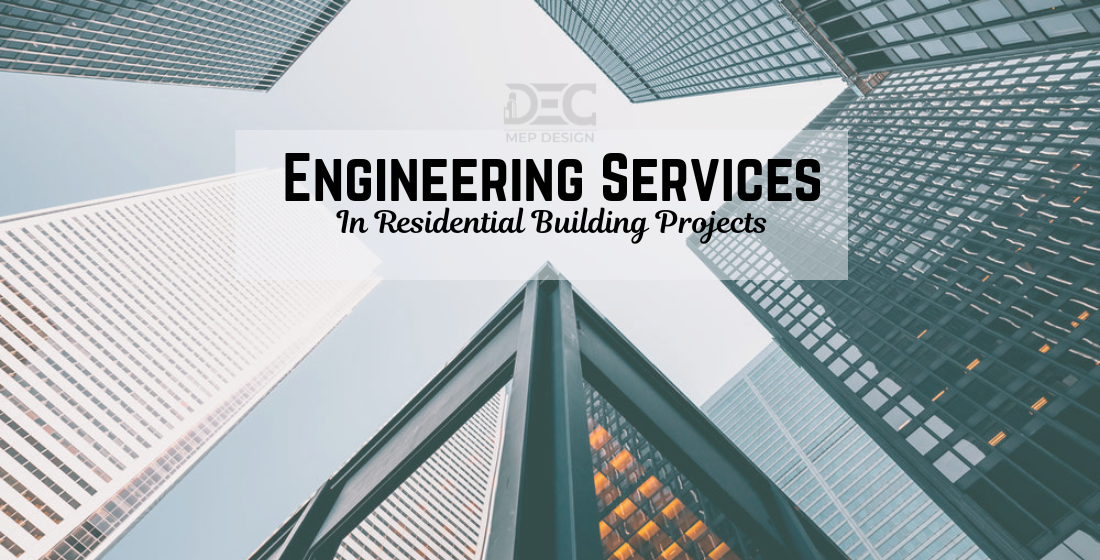When are Engineering Services Needed in Residential Buildings?
The function of engineering services is a crucial aspect of building design, building construction, and maintaining residential buildings. Whereas the significance of design and architecture is predominantly highlighted, engineering has a vital role to play in making buildings safe, operational, and environmentally friendly. But when do they need these services, and why are they so crucial? This blog will attempt to answer these and enlighten readers on the various construction phases where engineering skills play an essential role in residential building projects.
1. Initial Planning and Design Stage
Engineers get involved right from the initial stages of a residential project in the planning and design phase. Architects work on aesthetics and layout, but engineers see to it that the building is strong, safe, and functional. Calculations are made for load-bearing walls, foundations, and roofs so that the design can be feasible and meet building codes.
Structural Engineering:
Structural engineers analyze the submitted design for stability and integrity. They determine what kind of material to utilize and how to design the structural systems (such as beams, columns, and foundations) that will carry the building’s load.
Mechanical, Electrical, and Plumbing (MEP) Engineering:
MEP engineers design systems that manage heating, ventilation, air conditioning (HVAC), electrical cabling, water supply, and drainage. All of these systems are essential to the comfort, functionality, and safety of the house.
2. Building Permits and Approvals
Residential buildings need to adhere to local building laws and regulations before construction. The civil engineering designs should be approved and scrutinized by the local authorities to validate if they have met the safety requirements. Engineers tend to provide detailed drawings, calculations, and reports for obtaining the permits.
Civil Engineering and Site Surveying:
Civil engineers evaluate the site of construction to ensure that the soil is appropriate for the intended building. They will identify the most suitable way of constructing foundations, considering variables such as soil, water table, and environmental factors.
3. Construction Phase
After construction begins, engineers manage the execution of the design and double-check that everything is constructed as laid out in the plans. They also inspect to confirm that the building materials and construction practices abide by quality guidelines and regulatory specifications.
Structural Engineering During Construction:
The structural engineers also conduct site visits during construction to check the progress and make sure that the structural components are being constructed according to the design. Engineers also offer solutions to maintain the project schedule if there are any problems or changes in the construction process.
MEP Engineering During Construction:
As the construction goes on, MEP engineers make sure that the HVAC systems, electrical, plumbing, and other installations are properly installed. They have to comply with safety standards and function optimally once the building is occupied.
4. Post-Construction and Maintenance
Once construction is over, engineering services still have a vital role in ensuring the safety, usability, and energy efficiency of the building.
Structural Integrity Inspections:
Structural engineers can conduct regular inspections to monitor the health of the building over time. This involves checking the foundation, beams, and other structural members for any evidence of wear and tear or structural failure that might result in a threat to the occupants.
MEP System Maintenance:
The MEP systems installed during construction require ongoing maintenance to ensure that they function properly. Mechanical engineers may be called in to service HVAC systems, while electrical engineers may conduct periodic checks to ensure the electrical systems remain up to code.
5. Renovations or Additions
Each time there is a major renovation or addition to a residential building, engineering services are needed again. Whether this is adding another floor, increasing the area of living space, or making changes in plumbing and electrical systems, engineers have to determine the feasibility of the intended changes. They make sure that structural integrity is not compromised and that new systems are integrated well into the existing ones.
Conclusion
Engineering services are essential at every phase of a housing building project—from design to construction and then to maintenance and renovation. Structural engineers, MEP engineers, and civil engineers make sure that buildings are safe, functional, and durable. They assist in managing complex issues, ensuring that the finished structure meets building codes and is capable of carrying the load of its occupants. Whether you’re constructing a new home or undertaking a renovation, consulting with engineers early on and throughout the project will help ensure a successful outcome.
Whether you’re planning a new residential project, a renovation, or expanding your franchise, our expert team is here to support you every step of the way. From initial planning to post-construction maintenance, we provide end-to-end engineering solutions tailored to your needs. If you have questions about a specific project or want to explore how we can work together, let’s connect.
How-To: Integrate Engineering Services into Your Residential Project
- Start with a Project Scope & Site Assessment
Begin by outlining the goals, budget, and timeline of your project. Engage a civil or structural engineer early to conduct a site survey and determine any geological or environmental concerns.
- Collaborate with Architects and Engineers During Design
Involve structural and MEP engineers alongside your architect during the initial design phase. This ensures the layout supports structural integrity and the mechanical systems are planned efficiently.
- Get Your Engineering Drawings & Permits Ready
Your engineering team will produce technical drawings and calculations needed for code compliance. Submit these to the local building department to obtain the required permits before construction.
- Hire Qualified Contractors with Engineering Oversight
Ensure your general contractor coordinates closely with the engineering team during construction. Schedule periodic site visits with engineers to resolve unforeseen challenges.
- Plan for Post-Construction Inspections & Maintenance
After completion, conduct a final inspection with your engineering consultants. Set a schedule for routine maintenance checks, particularly for MEP systems, to prolong your home’s lifespan.
Frequently Asked Questions
Yes. Even small projects like adding a room or remodeling a basement can affect the structure or utility systems of a home. Engineering services ensure these changes are safe, code-compliant, and efficient.
Structural engineers focus on the physical stability of the building (foundations, beams, walls), while MEP engineers handle systems like HVAC, plumbing, and electrical to ensure comfort and functionality.
Ideally, engineers should be involved from the planning stage. Early involvement ensures better design coordination, cost control, and a smoother permitting process.
Yes. Engineers typically provide detailed technical drawings and calculations required for permit applications. They can also help revise plans if requested by the local authority.
Skipping engineering input may result in unsafe construction, legal violations, unexpected costs, or long-term system failures — all of which are far more expensive to fix later.
Yes. Periodic inspections, especially of structural elements and MEP systems, help catch issues early and maintain your home’s safety and efficiency over time.





No comment